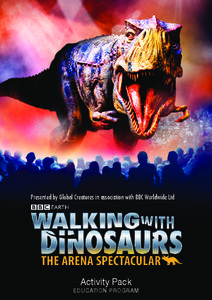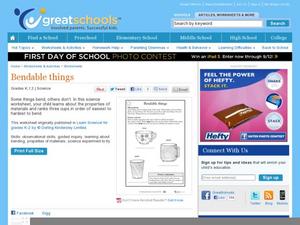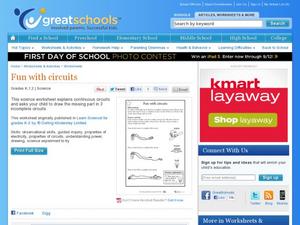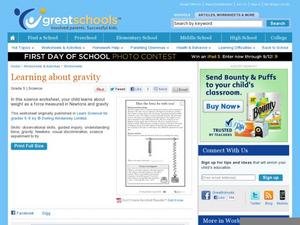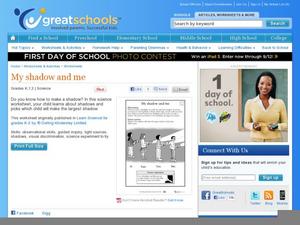Curated OER
Science Concept Maps
A collection of concept maps has some terms filled in and others left blank for young scientists to fill in. This library can provide you with many pop quizzes for all of your middle to high school science curriculum.
BBC
Walking with Dinosaurs
Breath new life into your class's study of dinosaurs with this extensive collection of materials. Offering everything from a printable T-rex mask, word searches, and connect-the-dots activities to informational handouts, hands-on...
Curated OER
Do Some Research
In this science research worksheet, students read the question about space with no matter and research the answer to the question. Students write the answer on the blue line provided and then write a short report about space matter on...
McAuliffe-Shepard Discovery Center
Global Warming in a Jar
This well-organized lab activity introduces earth science pupils to the greenhouse effect. They will set up two experiments to monitor temperatures in an open jar, a closed jar, and a closed jar containing water. Ideally, you would have...
Curated OER
Chemistry Study Room
In this chemistry worksheet, students are offered a variety of assistance to help them be successful in organic chemistry. They will have access to the library, missed class notes and computer interactive programs to help them with...
Curated OER
Animal Homes
Match animals to their environments with a cute lab activity. Kids draw a line between each animal, such as a fish, a rabbit, and an ant, to the place where it lives. For hands-on practice, a science investigation instructs learners to...
Curated OER
Are You Aware?
Bring the five senses to life with a fun science experiment! Kindergartners and first graders read an explanation of the five senses, then identify which items Sophia can sense if she is blindfolded. A science explanation at the bottom...
Curated OER
Fast and Slow Motion
Explore the world of motion and force with an activity for kindergarten and first grade. After determining how people can make balls or bikes move slower, kids use a cardboard tube and a marble to experiment with motion and speed. A...
Curated OER
Getting nosy
A nose knows! Connect animals to their noses with a fun science activity. Animals include elephants, rats, pigs, and even humans. For a science exploration, kindergartners answer questions about what they can smell. A great addition to...
Curated OER
How Light Can "Bend"
Examine the properties of light with a fifth grade science experiment. Pupils find out how light bounces off the surface of a mirror, as well as how a periscope works. For the science investigation part, kids build their own periscope...
Curated OER
Is It See-Through?
Explore transparancy with a science experiment on different materials. After reading an explanation on how to determine if something is see-through with a flashlight, kindergartners decide if certain materials are opaque or not....
Curated OER
On The Light Side
Kindergartners identify different sources of light in a science activity. They view pictures of a flashlight, a match, and a lamp, among others, and color the part of the picture that creates light. A science activity prompts them to...
Curated OER
All About Germs
How do people get sick? Youngsters explore the world of germs and microbes with a lab sheet and science investigation. After identifying the unhygenic practices in a picture of a kitchen, fifth graders conduct an experiment with bread...
Curated OER
Attract or Repel?
Opposites attract with a fun science experiment on magnets. With a short paragraph on background knowledge, the lab sheet prompts third and fourth graders to choose which pairs of magnets will attract, and which pairs will repel. A...
Curated OER
Be Kind to Your Teeth
What kinds of food can be bad for your teeth? Kindergartners and first graders explore dental health with an interactive science inquiry. Given a choice of foods such as celery, cake, and milk, kids choose which ones are better for their...
Curated OER
Being Forceful
Young scientists consider the forces of push and pull, start and stop, and try to categorize each one correctly. There are five cartoon drawings of kids performing an activity. Learners must write push or pull, and start or stop in the...
Curated OER
Bendable Things
What kinds of cups can bend? Kindergartners find out with a straightforward science inquiry, designed to teach them about the properties of materials. They hypothesize about the flexibility of a china cup, a plastic cup, and a paper cup....
Curated OER
Can You Bag It?
Put your class's observational skills to the test with a science experiment about paper and plastic bags. After reading some background knowledge about the materials in plastic grocery bags, third graders interpret a chart to answer a...
Curated OER
Fun with Circuits
What kinds of things need electricity to work? Kids draw the missing parts to three incomplete circuits in a learning exercise about power and electricity. The science exploration asks them to build a circuit to a light bulb, but this...
Curated OER
How Soluble Is It?
Is sugar more soluble than salt? Experiment with water and solubility with an elementary science activity. After interpreting data from a bar chart, fifth graders use different types of sugar to determine if the size of sugar particles...
Curated OER
Learning about gravity
Learn how to measure weight with newtons in a science experiment about gravity. After they read a short paragraph about force, fifth graders draw an arrow to indicate which way a spring is being pulled. Next, they survey their family...
Curated OER
My Shadow and Me
Practice making shadows with a kindergarten science experiment. After deciding which picture would represent the biggest shadow, kids use a flashlight to experiment with their own shadows. For extra fun, have kids mark their shadows...
Curated OER
Plant Groups
Compare different types of leaves in a science exploration. First, third graders identify common characteristics of various plants, such as daisies, fir needles, and cypress leaves. They then determine if the plants in each group are...
Curated OER
Being Shadowed
What causes a shadow to appear? Have kindergartners and first graders explore shadows with a fun science activity. After reading a short paragraph about light sources, they draw a shadow for a little girl based on the location of the...

